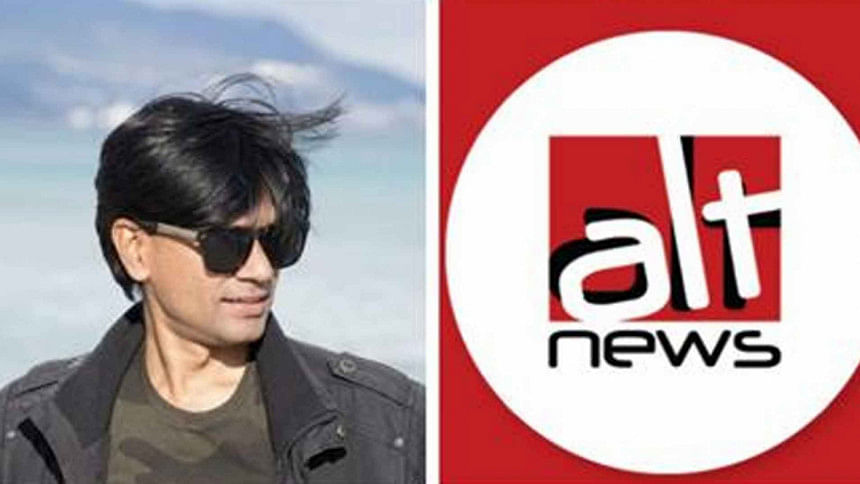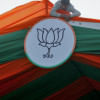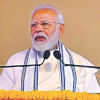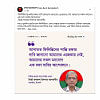Exposing disinformation is a crime in Modi’s India

In early 2017, when I was mulling over launching BD FactCheck – the first fact-checking initiative in Bangladesh – we looked for who else in the region was already working in this field. We came to know about two people: Pratik Sinha and Mohammed Zubair. They co-founded Alt News, one of the first ventures in South Asia that dedicates itself to countering disinformation and exposing the actors behind it. Since then, the fact-checking organisation's relentless fight against political misinformation never ceased to amaze me and many others. Zubair and Pratik's dedication inspired many fact-checkers in and outside India to carry on with the thankless job.
On June 27, we woke up to the news that Mohammed Zubair had been arrested by Delhi police based on a complaint from a Twitter user claiming that one of Zubair's tweets had hurt their Hindu religious sentiments, an accusation that was termed as "trumped-up" by critics.
The arrest of Alt News' co-founder earned sharp responses from different quarters in India and around the world. Pointing towards the divisive politics of the ruling Hindu nationalist Bharatiya Janata Party (BJP), the Editors Guild of India (EGI) said in a statement that it was "apparent that Alt News's alert vigilance was resented by those who use disinformation as a tool to polarise the society and rake nationalist sentiments."
Rahul Gandhi, former president of opposition party the Indian National Congress, said that Mohammed Zubair had been targeted for his role in exposing the BJP's hate, bigotry and lies. "Arresting one voice of truth will only give rise to a thousand more. The truth always triumphs over tyranny," he tweeted.
UN Secretary-General Antonio Guterres' spokesman Stephane Dujarric responded to Zubair's arrest by saying, "Journalists should not be jailed for what they write, tweet and say."
Looking at the recent years' record in the world's largest democracy, the move to arrest Zubair should not come as a surprise at all. Alongside India's gradual shift towards right-wing populism, the space for free speech has been shrinking for about a decade in the country that is being ruled by Narendra Modi, a permanent member of the RSS (Rashtriya Swayamsevak Sangh) since 2014.
Newsmen across India have been increasingly targeted in different forms for what they do. According to the Committee to Protect Journalists (CPJ), 2021 was one of the deadliest years for Indian journalists in the past decade, with six killed between 2021 and 2022.
The Global Press Freedom Index, which is published by Reporters Without Borders (RSF), ranked India 150th among 180 countries. The organisation has cited "violence against journalists" in India as one of the reasons for the declining press freedom in the country.
In March this year, Rana Ayyub, one of the most prominent faces of India's journalism industry and a Modi critic, was barred from leaving the country as she was flying to Europe to speak about the intimidation and repression that Indian journalists faced. Multiple cases were filed against Ayyub to prevent her from speaking out.
In such an adverse situation, Mohammed Zubair was committed to exercising his right as a journalist and as a citizen, and kept exposing the actors who regularly spread hate and misinformation targeting the minority communities in India, especially the Muslims.
Alongside fact-checking, Zubair also monitored hate speech against the minorities in the Hindu-majority nation. One of his recent tweets highlighting the controversial remarks made by Nupur Sharma, a spokesperson for the governing BJP, about Prophet Muhammad during a televised debate, was widely shared and led several Muslim countries to lodge strong protests with India. The BJP had to suspend Sharma from her post to appease some of India's Muslim allies in the Gulf. Later, during an interview with a right-leaning news outlet, Sharma herself held Zubair responsible for what happened to her.
For the BJP, that was enough of a blow from a journalist they had to encounter almost regularly. A barrage of hate and threats were unleashed against Zubair by an IT cell that boasts of having hundreds of thousands of online trolls and activists. A number of cases were also filed against him, and ultimately, he was arrested to stop what he does – exposing the campaigns of hatred and disinformation targeting the minorities led by actors close to the ruling party.
On June 13, India signed a joint statement at the G7 Summit to protect "freedom of expression, both online and offline, as a freedom that safeguards democracy and helps people live free from fear and oppression." But Zubair's arrest and the record of previous years tell a different story. In Modi's India, exercising one's freedom of speech to criticise the ruling elites and exposing the disinformation propagated by the right-wing demagogues are deemed as crimes. Suppressing the fact-checkers will only help to deteriorate the already polluted online information ecosystem in a polarised nation like India, and that will bring more chaos. The only way out of this is for the sane voices within the country to step forward to push back against their government's reckless actions.
Qadaruddin Shishir is a fact-checker based in Dhaka.

 For all latest news, follow The Daily Star's Google News channel.
For all latest news, follow The Daily Star's Google News channel. 











Comments